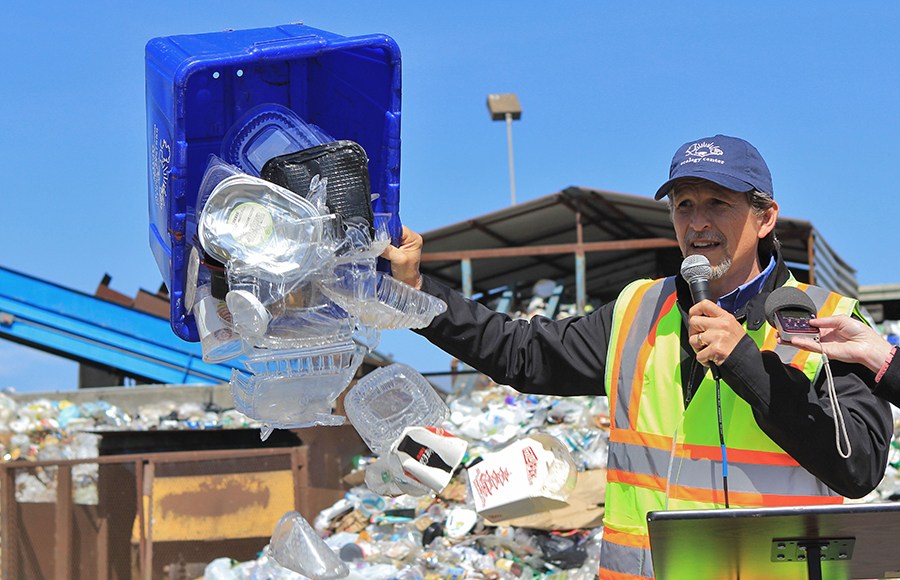Mayor Jesse Arreguín hosted an event Tuesday at Berkeley Recycling Yard to introduce legislation that deters city restaurants and cafés from using single-use plastics and foodware.
About 20 community members gathered to listen to Arreguín speak in front of several mounds of plastic recyclables. The plastic in the background of the talk represented the volume of a day’s worth of single-use disposables collected in Berkeley, according to Martin Bourque, executive director of the Ecology Center, who also spoke at the event.
Disposable-Free Dining, the new legislation, would require that Berkeley restaurants use reusable dishes and takeout foodware from a preapproved list of recyclables, according to a press release. In addition, vendors will charge 25 cents for every disposable beverage cup or food container provided. Other disposable utensils, straws and napkins will be provided only upon request or at self-serve stations.
While there are waste-reducing legislations concerning disposable straws in Sacramento and a plastic bag ban in Alameda County, Disposable-Free Dining is the first of its kind to prohibit all types of disposable plastic materials, Arreguín said during his speech.
“Many dining establishments continue to use single-use cups, plates, boxes, straws and cutlery,” Arreguín said to the crowd. “That’s why we feel it’s essential that we must create a mandate for businesses in our city to do the right thing.”
Other speakers included Shilpi Chhotray, senior communications officer of Break Free From Plastic; Samantha Sommer, the waste prevention program manager for Clean Water Action; Jackie Omania, a third-grade teacher from Oxford Elementary School; and Mabel Athanasiou, Brazil Fisher-Johnson and Sam Felix Domingo, three of Omania’s students.
“Most disposables are used for just a few minutes before becoming waste that lasts forever,” Chhotray said to the audience. “We are drowning in plastic.”
According to Bourque, it is expensive to handle plastics because of food contamination and the sorting process. He noted that since 2013, the tonnage of plastics has risen while their prices have continued to drop.
Sommer noted in her speech that she believed businesses will not lose profit through this legislation, using the ReThink Disposable campaign, which assists food establishments in implementing cost-saving practices that eliminate waste, as an example. Through this campaign, businesses saved between $1,000 to $22,000 a year, while eliminating 85,000 to 150,000 disposable pieces of plastic packaging, according to Sommer.
Over the past three years, Omania’s class has reduced its waste from five four-gallon bags of waste in the span of a year to a one-quart jar.
“If we 21 nine-year-olds can have a zero-waste classroom, then Berkeley can be a zero-waste community, too,” Athanasiou, one of Omania’s students, said to the crowd.
Berkeley City Council referred the legislation to the Zero Waste Commission, which will continue to hold public meetings to obtain additional input. Bourque hopes that the legislation will be enacted as early as July 2019.
Contact Andreana Chou at achou@dailycal.org and follow her on Twitter at @AndreanaChou.
Written by By Andreana Chou. This article originally appeared on The Daily Californian on Thursday, April 26, 2018 at http://www.dailycal.org/2018/04/25/disposable-free-dining-berkeley-mayor-proposes-legislation-reduce-plastic-waste/



